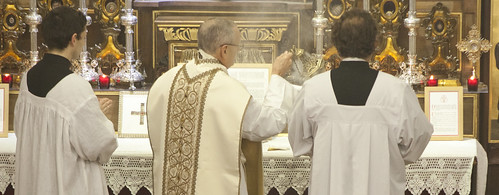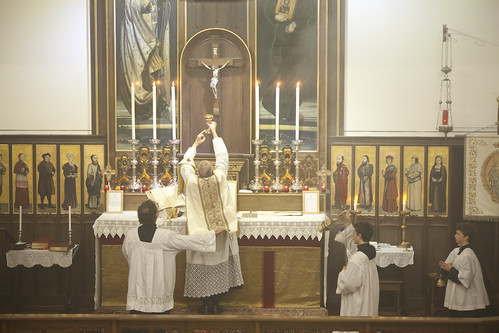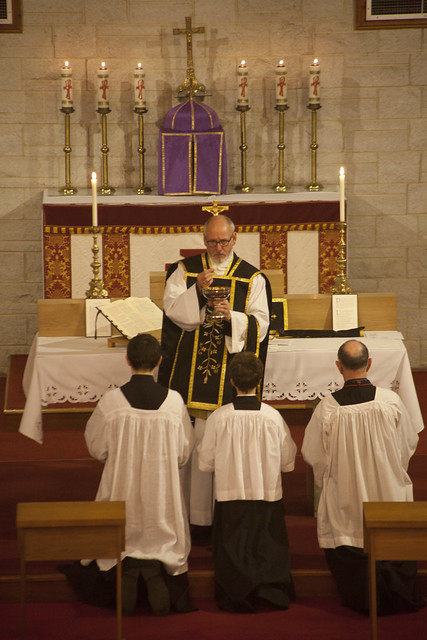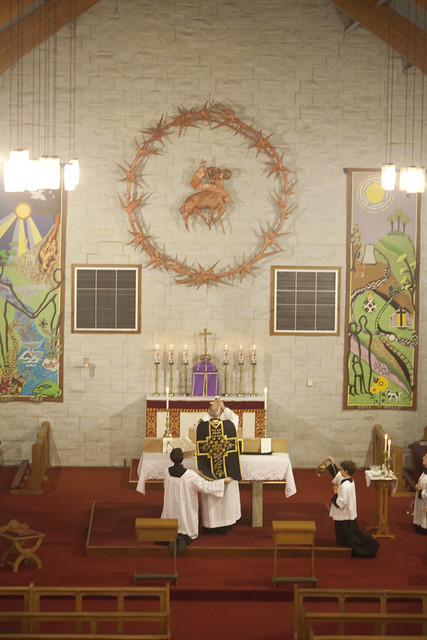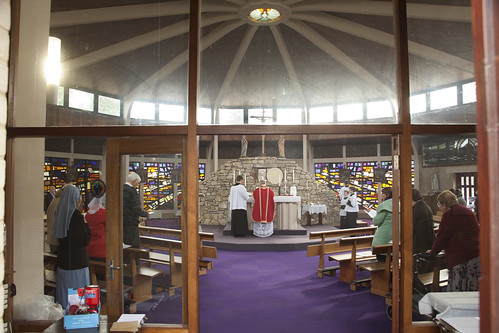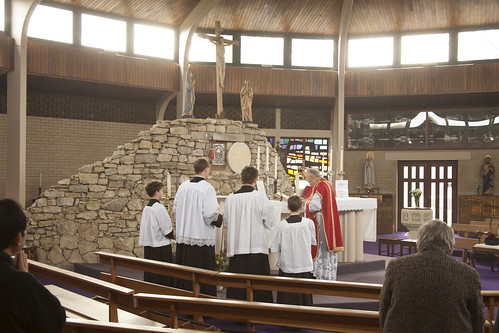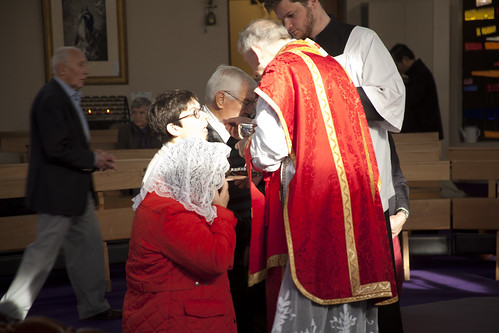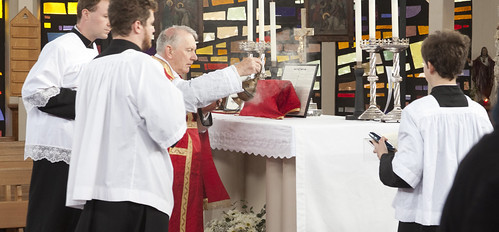Chairman's Blog
Correctio Filialis: it's not going away
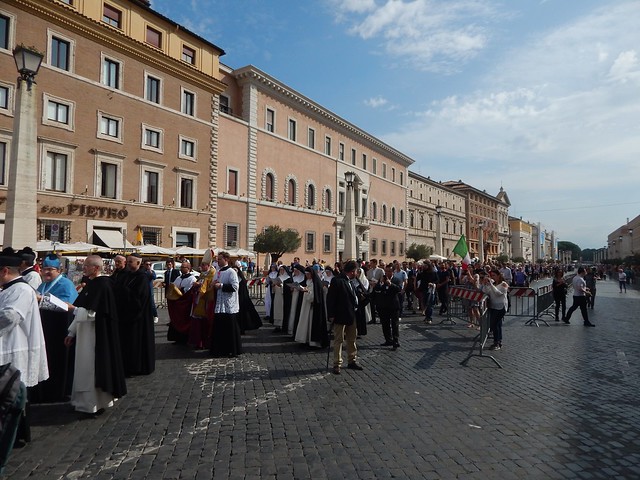 |
| The traddies on the march: the Summorum Pontificum Pilgrimage in Rome marking the 10th anniversary of Summorum Pontificum. It turns out this is just the vanguard. |
Hard on the heels of the distinguished theologian Fr Thomas Weinandy publishing a letter to Pope Francis strongly criticising his government of the Church, Dr. Gregory Popcak has published a remarkable article on the Patheos site, calling for critics of those who say they are 'confused' by Amoris laetitia Ch 8 need to 'repent' of grossly patronising clericalism.
Not all readers may understand the significance of this, so allow me to fill in the background. Dr Popcak, as he explains in the article, is not only a 'pastoral counsellor', but is head of a major centre of pastoral counselling, and trains pastoral counsellors. The Church in the United States has the resources (and of course the needs) to maintain an entire industry of pastoral counselling. Maybe I'm too English, or too traditional (I'd rather talk to a priest), but this kind of thing isn't really my kind of thing. But that's just the point. This industry of pastoral counselling going on over the pond has got absolutely nothing to do with an interest in the Traditional Mass, which some people are now trying to suggest is the common factor in opposition to liberal interpretations of Amoris laetitia. Well, they couldn't be more wrong. This guy is from the centre of the 'conservative', Pope St John Paul II-focused, mainstream, establishment Catholic world, and the Patheos platform, which has hosted a good many attacks on traditional Catholics over the years, is this world's in-house magazine.
Charles Collins, writing in Crux, wanted to play down the significance of the Filial Correction, observing (with some justice) that its language and signatories lean towards the traditionalist end of the spectrum of opinion. He continues:
Instead of presenting a unified front to the pope, the filial correction has highlighted the differences among conservatives in the Church under Francis.
Not just between the Weinandys and the Shaws, but also the numerous conservative Catholics who are confident Amoris Laetitia should be read in a way that doesn’t change the Church’s practice on sexual ethics and position on communion for the divorce-and-remarried.
But this is where he is wrong. The purpose of the Filial Correction wasn't to garner support for the Filial Correction. The purpose was to raise the level of debate about Amoris laetitia and to encourage those with misgivings about the liberal interpretation of Amoris to come forward. In this it has been staggeringly successful. Perhaps it is a coincidence, but the 'Overton Window' of criticisms of the policies and (apparent) personal attitudes of a reigning Pope seems to me to have shifted more in a couple of months than it had in the previous century and a half. Whereas on the eve of the publication of the Correction I was wondering if the signatories would be able to show their faces in public afterwards, I now find myself in the company of a roll-call of distinguished figures. Something important has changed.
The number of academic theologians (and philosophers etc.) who'll sign up to any 25-page theological commentary on any subject is limited, because academics spend their lives using their own words to express their own nuanced positions and teasing open differences of opinion. But the differences between those who signed the Correction and those who've put their reputations on the line to criticise the liberal interpretation of Amoris, using their own words, is hardly a source of comfort for the proponents of that interpretation, because it demonstrates precisely the breadth of the coalition ranged against them.
I have explained before on this blog that it is far easier to assemble a coalition against something than for something, and this explains why progressives often appear more united than conservatives. Well, in this case the boot is on the other foot. The progressives are trying to defend something, admittedly something rather unclear, and the criticisms of it are coming from a wider and wider range of places. Listen to Dr Popcak. He writes with a calm fury:
Deacon Bill, I have no doubt you are a good and faithful man. I am also quite sure you mean well, but I call you to repent of the incipient clericalism that infects your position that the only possible explanation for asking Pope Francis for clarification of chapter 8 of AL is childish obstinacy. I challenge you, and others like you, to repent of the idea that the voices of the thousands of people gracefully striving to live the gospel in their difficult marital circumstances should be discounted. I challenge you to respond with a more authentic approach to both pastoral ministry and evangelization; namely, one that listens to the lived experience of those who are faithfully striving to live the teachings of the Church instead of one that patronizes the laity with the soft clericalism of low expectations.
Why is this happening? People like Fr Weinandy and Dr Popcak have built careers, reputations, even livelihoods, on a positive relationship with the ecclesiastical establishment. For the past 150 years people in that position have not openly criticised the Pope. Now they are. What has brought about this change?
The progressives have no idea what forces they have unleashed. What they have done is pushed these good people into a corner. They have reached their non-negotiable principles. To give up on the indissolubility of marriage, the consequences of mortal sin on the life of grace, and all the other things now being thrown into the air by progressives would be worse than losing their careers, reputations, and livelihoods. This reality can be expressed either in terms of human psychology, or in terms of supernatural Faith, but whether you prefer to think of it as being about their entire self-understanding as Catholics, or what their Faith just will not allow them to do, they have reached the end of the rope.
And you know what? There are lots more people like that out there. Not as many as would be nice, to be sure: there are many time-servers in the Church, and it was ever thus. But there are lots of good people, whose intelligence and integrity will not allow them to - as they see it - acquiesce in apostasy. And this, my friends, may be what the indefectability of the Church looks like in the 21st century.
This is going to run and run.
Support the work of the LMS by becoming an 'Anniversary Supporter'.
ICKSP Sisters arriving in England

The date has now been fixed for the arrival in England of a group of Sister Adorers of the Royal Heart of Jesus, who will establish a community alongside the Institute of Christ the King Sovereign Priest apostolate in Lancaster Diocese.
Support the work of the LMS by becoming an 'Anniversary Supporter'.
All Saints and All Souls in Oxford and Didcot
I sang in SS Gregory & Augustine in Oxford for All Souls, for the Priest in Charge, Fr John Saward (above), and the following day, for All Souls, in Didcot at the Church of the English Martyrs for the Parish Priest, Fr Phillip Harris. I think the latter was probably the first Traditional Sung Mass in the church since the 'changes'. It was a privilege to be of service to Fr Harris in his bringing the Traditional Mass to his parish and his (enormous) church, one of the great things which Latin Mass Society volunteers can do. Fr Harris celebrates Low Mass in English Martyrs most Wednesday evenings.
Support the work of the LMS by becoming an 'Anniversary Supporter'.
Fr Thomas Weinandy, Capuchin theologian, criticises Pope Francis
This caught my eye on Crux partly because Fr Weinandy used to be in Oxford, as head of Greyfriars. It is interesting because Fr Weinandy is something of an establishment figure: a former advisor to the US Bishops' Conference, a member of the International Theological Commission, and a senior member of his order, the Capuchin Franciscans, who aren't exactly traddy bad-boys. And here it is, being reported on John Allen's website, Crux.
It is one of a number of indications that the theological establishment in the United States is not happy with the direction of travel under Pope Francis.
- Fostering “chronic confusion.”
- “Demeaning” the importance of doctrine.
- Appointing bishops who “scandalize” believers with dubious “teaching and pastoral practice.”
- Giving prelates who object the impression they’ll be “marginalized or worse” if they speak out.
- Causing faithful Catholics to “lose confidence in their supreme shepherd.”
Read the whole story on Crux
Support the work of the LMS by becoming an 'Anniversary Supporter'.
Pray for the dead this November
 The Latin Mass Society is selling the perfect collection of prayers this November: prayers for the Faithful Departed, taken from the Raccolta, the old official maual of indulgenced prayers, which was filled with prayers for all occasions authorised and encouraged by the Holy See.
The Latin Mass Society is selling the perfect collection of prayers this November: prayers for the Faithful Departed, taken from the Raccolta, the old official maual of indulgenced prayers, which was filled with prayers for all occasions authorised and encouraged by the Holy See.
Single prayers, prayers for every day of the week, prayers for the bereaved, can all be found in this handy little book.
Yours for £1.95 and not available anywhere else.
Support the work of the LMS by becoming an 'Anniversary Supporter'.
What everyone wants to see...
judging by the comments on Facebook, is more photos of the, er, striking church of Our Lady of Light in Long Crendon, which the Schola Abelis filled with Gregorian Chant last Saturday.
Fr Anthonly Conlon celebrated Mass for the Apostles SS Simon and Jude.
Sadly I didn't have my wide-angle lens, which is ideal to capture the shape of the building.
A good bunch of parishioners came along, and I judge the whole thing to have been a success.
Fr Conlon travelled 20 miles from his parish in Goring. Nine singers and four servers converged on the place for the occasion. We did it at the request of a regular worshipper with the agreement of the Parish Priest. It is all part of preserving the Traditional Mass and confirming it as part of the life of the Church: not just in a little ghetto for confirmed eccentrics, but everywhere, for everyone.
Support the work of the LMS by becoming an 'Anniversary Supporter'.
Mass in Long Crendon tomorrow (28th Oct)
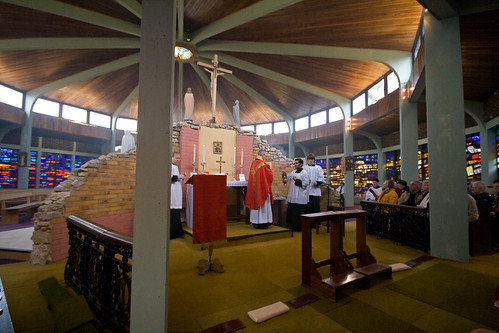 |
| The last time the EF was celebrated in the church, back in 2009. |
The feast of SS Simon and Jude will be marked by a Sung Mass in the traditional form in the Church of Our Lady of Light, Long Crendon, at 11:30am.
The address of the church is 4 Chearsley Rd, Long Crendon, Aylesbury HP18 9BS
It will be celebrated by Fr Anthony Conlon, and accompanied with chant by the Schola Abelis of Oxford.
Support the work of the LMS by becoming an 'Anniversary Supporter'.
Remembrance Sunday
Remembrance Sunday, 12th November, is coming up in the UK: the Sunday nearest to the 11th of November, the date the First World War ended, when by longstanding permission priests in England and Wales are allowed to celebrate a Requiem Mass for our war dead.
There will be truly worthy sung celebrations of the ancient Mass for the Dead in the Birmingham Oratory, and in St William of York, Reading, with the Fraternity of St Peter.
Those locations are about 100 miles apart, or a two hour drive. Between them, the only place where you will find a Sung, Vetus Ordo Requiem Mass on Sunday will be in Holy Trinity, Hethe, at 12 noon (click for a map).
This is the oldest Catholic parish church in Oxfordshire, noted for the beauty of its decorations. Mass will be celebrated by Mgr Bruce Harbert, the well-known liturgical scholar, and the singing will be led by Dominic Bevan.
Please join us to pray for the war dead, some of whom are buried in the graveyard next to this church.
Support the work of the LMS by becoming an 'Anniversary Supporter'.
A renewed attack on celibacy?
Reposted from December 2015
-----------------------------------------
The word is out that the next subject for discussion at a Synod of Bishops will be celibacy. I don't know if this is true, but it is worth reminding ourselves of exactly why the Latin Church (as opposed to the Byzantine, Maronite etc. churches) should not abandon celibacy.
A while ago I wrote a short series of posts on the topic:
The Attack on Celibacy is an Attack on the Priesthood
The Attack on Celibacy is an Attack on Marriage
Here are a few points from those posts.
First, we have come to this stage in the debate because, in a series of choices between strengthening or weakening celibacy, the Church's leadership has chosen to weaken it. These decisions have been understandable - it is important to stress that, taken individually, they may seem inevitable, or even laudable - but the cumulative effect has been to erode the principle of priestly celibacy. Examples of such decisions have been: the giving way to the massive departure of priests from their vows, and the moral support given by bishops to laicised priests, including groups calling openly for the end of celibacy; the promotion of married deacons, and the endemic confusion about deacons' obligations; the taking over of various liturgical functions by lay people, including women; and concessions made to former Anglican (and occasionally Lutheran) convert clergy.
If celibacy is of value, and St John Paul II liked to stress that it is, then we need to treat as being valuable. There is a price involved in maintaining the ideal of celibacy, and if we are not prepared to pay the price, then it will disapear. Tough decisions, perhaps harsh decisions, will be necessary from future Popes and from bishops who want to preserve and promote celibacy, and not just give it lip-service and take it for granted while it withers away.
Second, the priesthood is undermined by attempts to lower its costliness: the visible cost paid by those entering the priesthood, which demonstrates publicly their committment to the priestly ideal. The Eastern churches do not simply make do without celibacy: they have a disciplinary regime, of fasting, and an obligation to lengthy liturgies, which few Western priests would put up with for a minute. Well, our Western priests don't have to put up with it; it is not our tradition. Our priests' conforming to Christ is manifested in a different way. What this means is that the example of the Eastern churches does not make the liberal point that celibacy is unimportant; it does the opposite. A priesthood without any onerous obligations, a slack priesthood, has no historical precedent, and would have no future.
Third, the idea that priesthood can without further ado be combined with marriage undermines marriage, because it implies that marriage itself is not a serious committment with serious implications for one's way of life. In the liberals' conception, marriage is reduced to the status of an occasional sexual outlet for incontinent men. If that's what they think marriage is, it is no wonder that marriage is in trouble. And it is in trouble: it is in the most desperate trouble in the West, in no shape to shore up another crisis-ridden institution.
Liberals have a habit of taking for granted whatever they aren't currently attacking. When attacking celibacy, they take marriage, and the priesthood itself, for granted: they assume that if we carry on taking away the supporting attitudes and practices which surround these things, life will go on as before. It hasn't, and it won't.
See also my post on 'Part Time Priests'
Support the work of the LMS by becoming an 'Anniversary Supporter'.
LMS Pilgrimage to the Holy Land
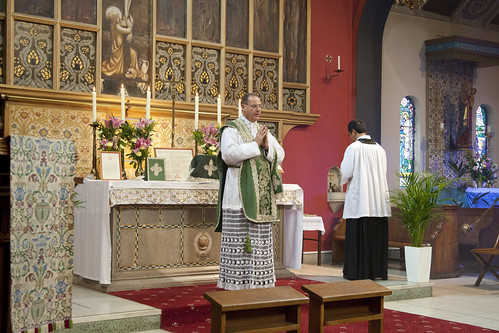 |
| Fr Martin Edwards celebrating Mass in his church of St Mary Magdalen, Wandsworth |
A 9-day pilgrimage with Traditional Masses at the Holy Sites
Fr Martin Edwards, Parish Priest of St Mary Magdalen’s Wandsworth, will be leading a pilgrimage to the Holy Land 10th-18th November 2017, with a daily Traditional Mass at the holy sites.
Flying from Heathrow on Friday 10th November, among the places pilgrims will visit during the eight day pilgrimage are Bethlehem, Mount of Olives, Mount Zion, Jerusalem, Qumran, Dead Sea, Galilee, Acre, Cana and Nazareth.
Unlike other pilgrimages to the Holy Land, this pilgrimage will have a Traditional Latin Mass every day. The cost is £1,369.
The pilgrimage is organised by Pax Travel and a full itinerary can be downloaded here.
Support the work of the LMS by becoming an 'Anniversary Supporter'.


